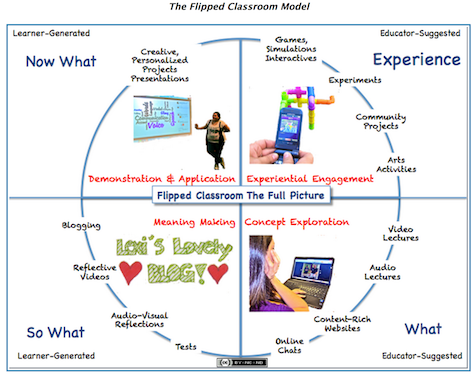Flipped Classroom
Flipped Classroom
Check out this link and see my comments below.
Leveraging the Flipped Classroom for Professional Development and Continuing Education
 (Jeff Cobb, 2019)
(Jeff Cobb, 2019)
I have observed this approach to learning in the grade 4-6 French Immersion classrooms at my son's elementary school. Along with my work in adult education, I also work as an Education Assistant. The grades 4-6 classrooms are now experimenting with a more collaborative approach to some sections of education. For example the students are working in groups for Science, Health and French projects. Students are creating and presenting as a group and are receiving information and resources from the teacher in advance so they can adequately prepare and use their time productively during the classroom time. This approach can be used with adult learners in my employment programs. The adult students are keen to know the schedule in advance and if they can do any work to better prepare themselves for each day. When they are prepared and have had the opportunity to review the material for a session they will ask more questions and be more involved in each workshop. I feel that this will enhance their experience in the program and will better prepare them for what lies ahead in their prospective employment.
Check out this link and see my comments below.
Leveraging the Flipped Classroom for Professional Development and Continuing Education
 (Jeff Cobb, 2019)
(Jeff Cobb, 2019)Definition of Flipped Classroom
"In a flipped classroom approach to learning, participants are assigned learning materials and tasks to engage with individually in advance of meeting in real time as a group. The goal is for this advanced preparation to foster more productive learning opportunities during live group sessions. Building off of shared foundational knowledge learners may, for example, be better prepared than in traditional classroom scenarios to actively discuss a topic or practice new concepts and skills. This higher level of engagement can, in turn, lead to much stronger and longer lasting learning outcomes" (www.leadinglearning.com 2019).I have observed this approach to learning in the grade 4-6 French Immersion classrooms at my son's elementary school. Along with my work in adult education, I also work as an Education Assistant. The grades 4-6 classrooms are now experimenting with a more collaborative approach to some sections of education. For example the students are working in groups for Science, Health and French projects. Students are creating and presenting as a group and are receiving information and resources from the teacher in advance so they can adequately prepare and use their time productively during the classroom time. This approach can be used with adult learners in my employment programs. The adult students are keen to know the schedule in advance and if they can do any work to better prepare themselves for each day. When they are prepared and have had the opportunity to review the material for a session they will ask more questions and be more involved in each workshop. I feel that this will enhance their experience in the program and will better prepare them for what lies ahead in their prospective employment.

Great insights on the flipped classroom approach! I’ve found that this model really helps students take ownership of their learning because they engage with materials before class and then focus on problem-solving and discussion during sessions. One challenge I’ve seen is keeping learners accountable for pre-class work. Tools like an assignment maker or structured task planner can help students organize readings, videos, and practice exercises so they arrive prepared. Pairing flipped lessons with clear assignment guidance creates an excellent balance between flexibility and responsibility.
ReplyDelete